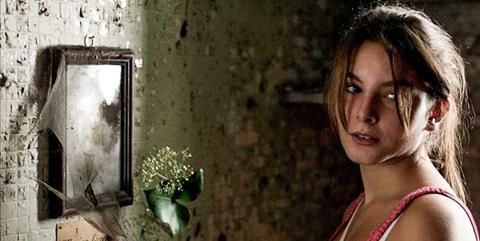Dir: Leonardo Di Costanzo. Italy-Switzerland. 2012. 80mins

A reluctant Neapolitan underworld gaoler and the 15-year-old girl he’s been set the task of watching over build a fragile, tough-but-tender rapport over the course of one day in Leonardo Di Costanzo’s convincing feature debut, which hoovered up a raft of collateral prizes on its Venice debut, and screens at the LFF after its equally well-received Toronto stopover. It’s a film that could easily make its way into more than a handful of arthouse slots in Europe and elsewhere.
The Interval never labours its metaphors, rooting its symbolic suggestions in understated drama and the authenticity of the performances by its non-professional leads,
Crossing over from documentaries, director Di Costanzo makes this disenchanted coming of age tale feel surprisingly real despite the fact that with its cast of six, narrow confines of space and time, and very occasional hints of mannered dialogue, it wouldn’t be difficult to imagine The Interval (L’Intervallo) playing out in a theatre rather than on the screen.
This edge of realism is enhanced by the dilapidated Neapolitan inner city setting and the fact that the characters speak such broad dialect that the film was released with subtitles in the rest of Italy. The grittiness, and a finale which does not take the easy route, help to ground the exercise and restrain it from any hint of boy-meets-girl sentimentality.
We’re in Gomorra territory here, but it’s Gomorra as a chamber composition, reduced to a single, leisurely story whose Camorra setting is milked, inventively, for symbolic resonance. When overweight, inarticulate street vendor Salvatore (Gallo) is given the job of watching over pretty, prematurely sexualised Veronica (Riso) in an abandoned institutional building somewhere in Naples, we’re not sure why he was chosen as gaoler (he doesn’t seem the type), who the guys giving the orders are, or what Veronica has done to deserve being locked up in this way.
We don’t find out all the answers, but the film gets close enough to explanations to round out the two characters – both of them victims in their way – and illuminate the fact that this ad hoc prison is a mirror of the greater prison that surrounds them.
The former convent school where the whole story pans out becomes a third character, part menacing, rusted, disintegrating hulk, part magical urban playground, with its flooded basement and overgrown garden. Luca Bigazzi’s camerawork underlines this play between house of horror and dreamspace, and a sound design that features, among other effects, a recurring plane-engine roar, further detaches the film’s scenic space from the world outside.
But The Interval never labours its metaphors, rooting its symbolic suggestions in understated drama and the authenticity of the performances by its non-professional leads, both of them working-class Neapolitan teenagers from the city’s notorious Quartieri Spagnoli who were selected after participating in a three-month theatre workshop.
Production companies: tempest, Rai Cinema, amka films
International sales: Rai Trade, www.raitrade.it
Producers: Carlo Cresto-Dina, Tiziana Soudani
Screenplay: Maurizio Braucci, Mariangela Barbanente, Leonardo Di Costanzo
Cinematography: Luca Bigazzi
Editor: Carlotta Cristiani
Production designer: Luca Servino
Website: www.intervalloilfilm.it
Main cast: Francesca Riso, Alessio Gallo, Carmine Paternoster, Salvatore Ruocco, Antonio Buil, Jean Yves Morard






















